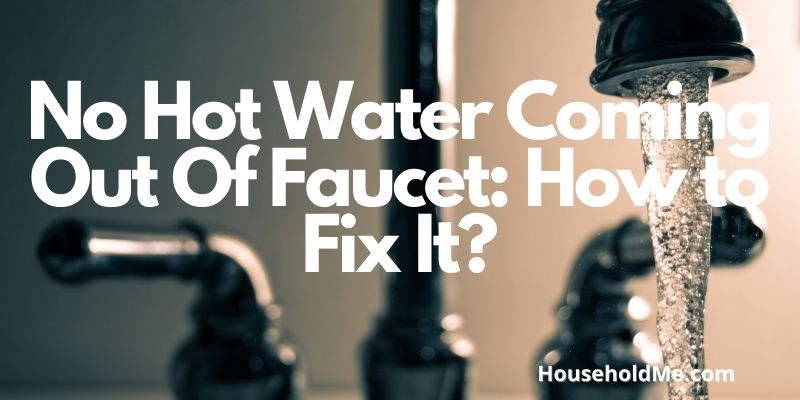When the hot water stops coming out of your faucet, it can be a huge pain in the… You may think that there is something wrong with either its source or how you’re using the faucet – but in reality, this just means one thing: You need to take care of some basic maintenance.

We all know that hot water is a vital part of our everyday life, but what happens when you don’t have any? Two possible causes of hot water loss, as well as solutions, are going to be explained in this article.
It’s hard to live in the 21st century and not have access to hot water. Whether you’re doing dishes, taking a shower, or simply washing your hands, having no hot water is just unthinkable.
Without hot water, you may be plunged into a major dilemma.
The two common causes for this happening are: there’s been an interruption or reduction in the water supply, or your heater has gone out.
When your air supply starts sputtering, it could be because there’s an obstruction in the system. This can cause hot water to stop coming out of taps entirely and go back into the tank instead.
We’ll be looking at a few different things that could possibly cause this issue.
There are a few things you can do to get hot water flowing in your home again.
To understand what’s causing the interruption, we need to take a look at some factors.
Check Every Faucet
The first thing to do is check all of your faucets for hot water.
A single faucet might become blocked, preventing water from flowing freely.
If you’re looking for an easy way to get your problem solved, calling in a professional plumber may be just the ticket.
Just Getting Cold Water
If you notice that there’s no hot water coming out from one side or another on your faucet, then it could mean something has gone wrong with your water heater.
This is particularly true if the cold side is doing admirably.
Water heaters can break for a number of reasons.
To make sure the water heater is working properly, you should flush it and allow time for all of its contents to be released.
There are a few details about flushing the water heater later on in this article.
Look For Frozen Pipes
People who live in states with harsh winters like New York, Minnesota, or Maine know all too well about the damage frozen pipes can do.
It’s like an ironclad seal that will keep water from flowing to all of the faucets in your home.
If the hot water doesn’t seem to be getting any better or you are only getting lukewarm water, this might be the cause of it.
Most plumbers will recommend that you have the pipes thawed out before trying to get water flowing again.
You may use a hairdryer or a heat gun to defrost the pipes.
Check Your Water Heater For Leaks
When your hot water isn’t working, it’s often because of a leaking water heater.
Furthermore, a water heater leak might directly lead to a shortage of water in your home.
The best way to identify a leaking heater is by checking to see if there are any puddles near the water heater.
Other sorts of leaks are more difficult to detect and will need the immediate assistance of a plumber.
You can take a few different approaches to fix the leak.
If the source of the leak is coming from loose-fitting valves, you can tighten or replace the valves on your own.
If you have a water heater that’s too old or rusty, it’s time to invest in a new one.
Thermostat inspection
The lack of hot water might be due to a malfunctioning thermostat.
Check the settings on your water heater’s thermostat to make sure they’re correct.
You can also try resetting your thermostat and waiting for the hot water to return.
When the temperature on your thermostat is continuously dropping, it could be an indication that there are technical issues with its functionality.
The thermostat may be outdated, faulty, or just not working properly anymore from wear and tear.
It would be best to get in touch with a professional to have the thermostat fixed or replaced.
Look For Any Blockages
If you don’t detect any leaks, a blockage or something may be clogging up your plumbing pipes and may be the source of your hot water issues.
Clogged pipes are usually the result of heavy sediments which prevent water from flowing.
Limescale, rust, debris, or heavy metal deposits might all contribute to this build-up.
Hence, you should call a professional plumber if there is any indication that your pipes are blocked.
At Heritage Plumbing, they utilize a drain camera to establish the origin of the obstruction and then clear it with a high-pressure jet.
Examine For Any Rust
The buildup of rust on pipes is a common reason why they may suddenly stop working.
If rust has formed on the outside of your tap, it is almost certain that it has formed on the inside as well.
Rust is a natural occurrence that can cause blockages in your pipes.
The best way to avoid rust is by replacing your tap when you start noticing the rust building on it.
At Melbourne Plumbing Group, tap installations are easily and efficiently done by professional plumbers.
Mineral Build-Up
A steady accumulation of mineral build-up affects many water heaters over time.
When the build-up becomes too much, it will restrict proper water movement or circulation.
As a result, you won’t be able to obtain hot water from your taps.
To make sure your water heater is working properly, it should be cleaned at least once a year.
If you want to have a safe and clean water supply, it’s important that you do this regular maintenance routine.
You may need to clean out your water heater more than once a year if you reside in an area with hard water.
Consider the following
Before you begin, there are a few things to consider while repairing your hot water problem.
First and foremost, you have to be sure that you have fully identified the cause of the problem, otherwise, it could lead you to a more serious one.
For example, if you change the settings on your boiler without knowing exactly what is wrong, it could further damage it.
Internal variables aren’t always to blame for these issues.
It’s possible that the water supply may be cut off.
There’s a chance the main water line is compromised.
In these situations, you should contact the appropriate authorities.
Another issue to consider is the power supply.
The wiring of the boiler should be checked as well.
The boiler will not function if the cables are broken.
When in doubt, contact a plumber.
If you’ve exhausted all of the methods and still see no improvement, it might be time to contact your manufacturer or an engineer.
Be aware that there is no one-size-fits-all answer to these situations.
It’s possible that there are many different issues, so take the essential measures after figuring out the situation.
Conclusion
Hot water has become part of our essential and daily needs.
Some individuals are unable to go about their regular routine without hot water
In emergency situations, the availability of it could actually save lives.
You won’t have to be concerned the next time you notice no hot water is coming out of the tap.
With our easy-to-follow guide, you will be able to solve this problem and continue doing what’s important to you.
